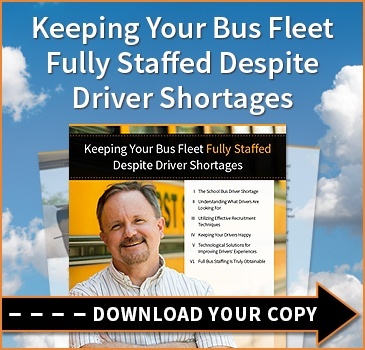If You Need Organization, You Need A Transportation Manager
published on May 31, 2013 by Sonia Mastros
transportation manager, school bus routing software, school bus driver
There is no fully autonomous system; even the most sophisticated applications for technology  are fully dependent on the expertise of human resources. This is especially true of transportation services, where the intervention of a transportation manager is essential because of the obvious human element in the system, therefore there must be a place that counters and ensures all situations respond to predefined efforts for time management and accountability. Due to the intricate nature of a school transportation system, the inclusion of a transportation manager is not just the inevitable choice, but a valuable decision in managing the various aspects of the system.
are fully dependent on the expertise of human resources. This is especially true of transportation services, where the intervention of a transportation manager is essential because of the obvious human element in the system, therefore there must be a place that counters and ensures all situations respond to predefined efforts for time management and accountability. Due to the intricate nature of a school transportation system, the inclusion of a transportation manager is not just the inevitable choice, but a valuable decision in managing the various aspects of the system.
The transportation system is one big organ that needs specific attention and concerted effort in keeping it running in the best and safest way that redeems resources and meets the goals set by all stakeholders, here is why you need the role of a transportation manager in making the objectives a reality:
Time and Scheduling
All the major players of the system, the parents, students, School administrators and the school bus driver needs to find a focal point of interaction, and that is through schedules that are implemented by the transportation manager. In any system of operation, the re-usability of resources is only achieved in scheduling, where certain resources are apportioned times for operations in ensuring that the objectives and goals of the process are met. The various resources and beneficiaries of the process interact on a calendar of events, planned, executed and monitored for efficient execution by the transportation manager.
Monitoring and Contingency
This is basically the task of ensuring that what is meant to happen, happens at the right time and within the correct parameters. Monitoring is an important task for the transportation manager in the mitigation of active risks, allowing you to initiate contingency measures to prevent a situation from happening. Take for example a child who is yet to board a bus to school, upon a five minute delay, the parents need to be called by the transportation manager's office to ascertain that the situation is under control, before it escalates to a missing student.
Accountability
As a parent or a school administrator, you need to have a person you can call for assurances that the plans for the semester have been finalized for student transportation; someone needs to be answerable in handling all those responsibilities. A transportation coordinator is essential in ensuring that all your needs are met in the best way possible, providing a way of interacting with the transportation system in the administration of your duties. You would need someone to respond to queries and challenges you might be facing with some of the students, or you might need to discuss incident reports that the students reported as having occurred in the bus, giving you the confidence to release the students into the custody of the transport system in getting them to and from home. You would also need assurances that the system is being run in the best way possible, and this responsibility is charged to the transportation manager's office in ensuring that all processes are correctly logged for review and strategic planning, and also measuring the reliability of the office.
Efficiency
There are so many resources used to in transportation services: the vehicles, the human resource in planning, administration, the drivers, fueling and servicing the vehicles, the monitoring and tracking systems among many. You would be more at ease if you got the assurance that all the resources allocated for the transportation system are used in meeting the constraints and goals set before the commencement of school semesters. A transportation manager's greatest task is ensuring that the entire system works well to reduces losses, by finding easier and cost effective methods for operations like deciding the safest and most efficient routes for the vehicles, organizing work schedules for the employees and other factors that might affect the output of the transportation system.






